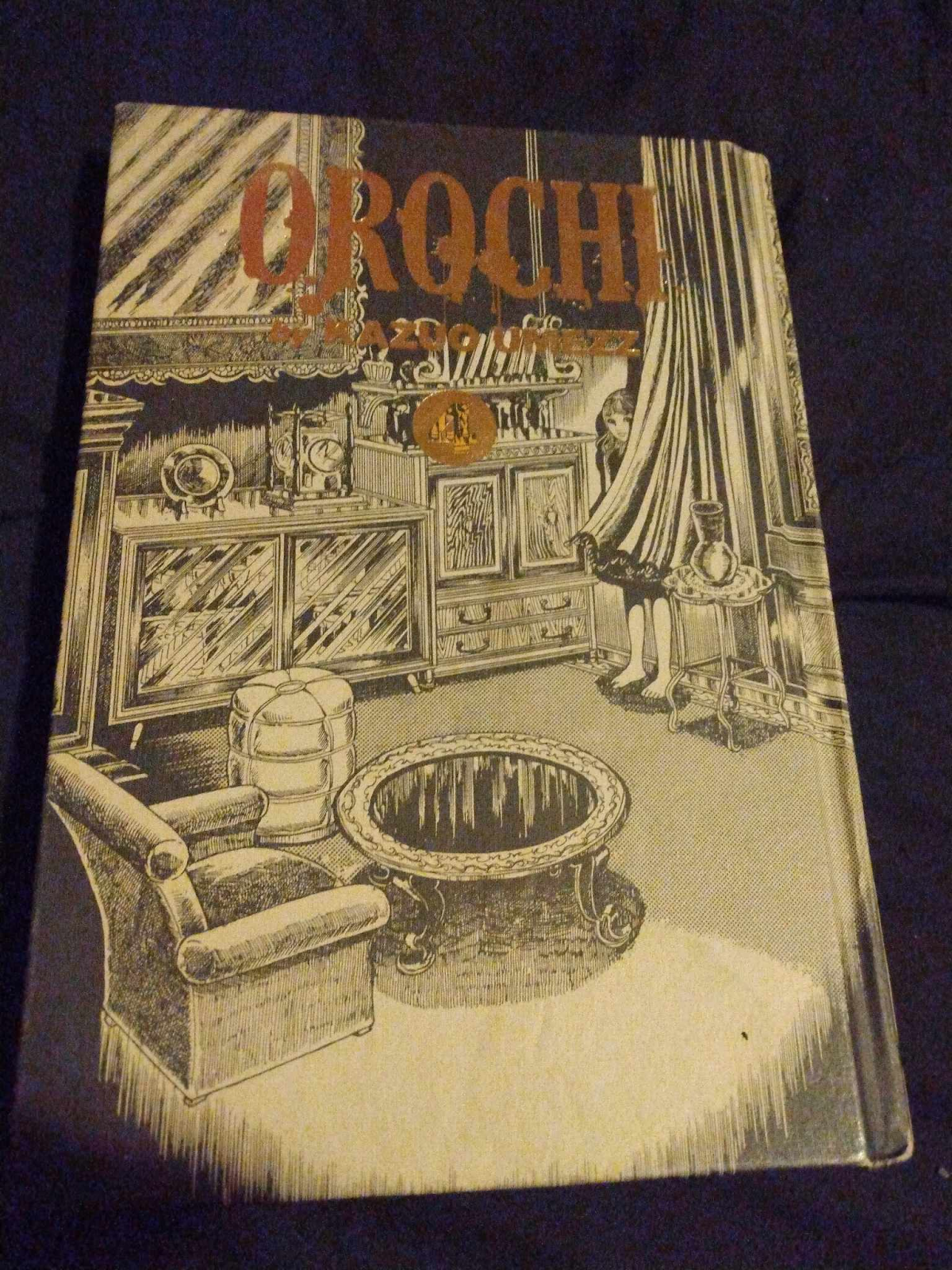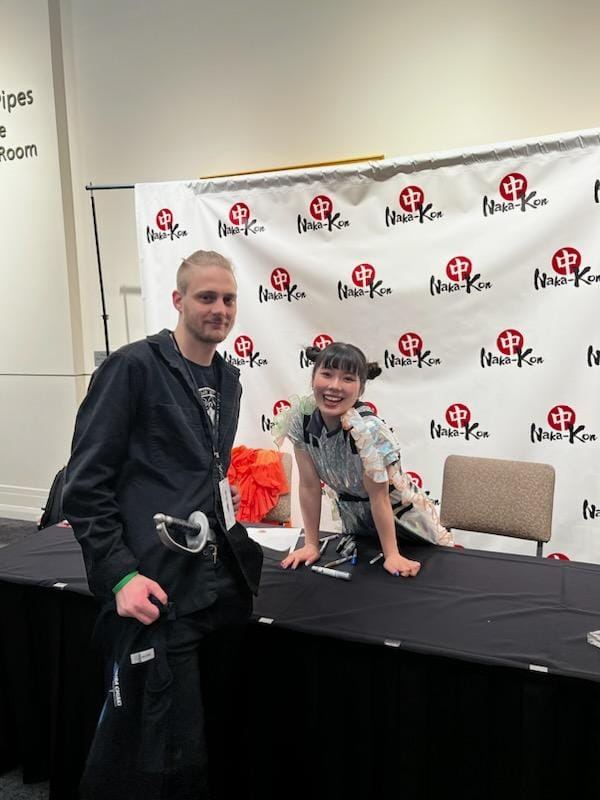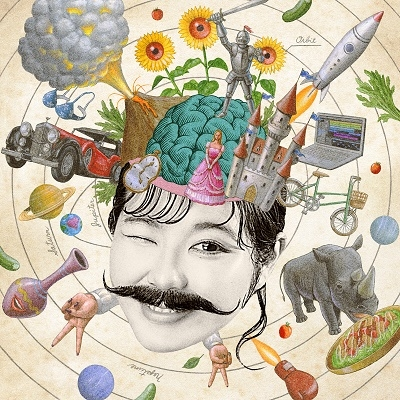Kazuo Umezz: Terror Slithers Into Our Lives
A review of Orochi 4
by Graham Swanson
Front Cover of the Viz Signature Edition, 2006.
Orochi
4 is a manga book about two scary stories previously published as a comic strip
around 1969 and 1970 written by Kazou Umezz. The first story, “Eyes” follows a
blind girl who witnesses a murder in her own home. A game of cat and mouse
begins between the girl and the murderer as he returns to the scene to retrieve
an ID that he dropped inside the house. The second story, “Blood”, follows two
sisters. One sister is given all the love and attention in the world, the other
is barked at and hit by parents, teachers, and eventually her husband. Both stories are from the perspective of stranger. A girl
who follows them yet is invisible to the people she watches.
The greatest strength of “Eyes” is it's suspense. Danger unfolds around this girl and takes control of the safety of her home. The blind protagonist is alone, and tries to save herself but makes many mistakes. She is left by herself after her father is arrested. No one is around for her except the killer himself. The most startling images are how she baracades the windows and doors. She can't hammer a single nail in straight. They all curl around the wood from the force of the hammer.
The Killer strikes!
“Blood” is rich
in gothic convention, and by the end is truly rabid with terror. The walls are drawn with a deep dark black. The very halls feel haunted. There is sadness in the girl's faces. There is scorn in the faces of the adults. The sadness of the once innocent little girl transforms into hatred.
Each story doesn’t
just alarm, it does not merely dare to put the book down, it also provides something
to chew on. Each work is wrapped in a sensation of very real fear like an
innocent father going to prison, abuse of the dying and sickly, buying children,
abusing servants, abusing the disabled, and the impact of violence. The book
seems to be asking as, “how could this happen?”
As
the narrator says in the haunting last pages, “This will never happen again.”
Will
it now? Really?
There
are some interesting shocks, and subtle manipulations, but
what stands out to Castle Swanson are the Gothic tropes throughout “Blood”.
The
Monzen family becomes a fallen aristocracy.
The two sisters Riza and Kasuzu are the last of
a bloodline.
Orphans
and peasants within the mansion live in fear.
The
young orphan girl becomes a maiden in distress.
No
one is safe from poundings and strikes of violence.
Darkness lays in the eyes of characters, in
the sky, in windows, and in deep hallways.
The
once great family mansion becomes an old, shady palace.
Horror
and terror occurs within.
The grotesque transformation of the innocent into monsters.
The supernatural narrator creeps into people’s lives unnoticed… and uninvited.
There
is a moment in “Eyes” that inspires dread. Tt grows from realistic
expectations and very real fears, yet seems offbeat. The Blind Girl sends her
best friend, a child, to stalk an adult murderer. The boy not only gets spotted by
the killer, but the killer is friendly, and gets the kid to tell him all the
information he needs to know. It’s uncomfortable to know that this blind girl just sent a boy into the snares of
a murderer. This villain shows that he is not some fool who got worked up in a moment of
passion, but actually a clever, calculating professional.
The
best part of “Eyes” is the constant danger. This girl is never safe. Even at home she risks burning the house down. If men come to the door, she has
no idea who is entering and leaving. If she leaves the house, she doesn’t know
where to find safety. If she tries to tell people what she saw, no one believes
her because she is blind. She is defenseless, weak, and vulnerable to the very real evils of the world.
The
best character, Risa, is welcomed in Castle Swanosn. She is a monster, but we get to see this monster as a
child. She didn’t start off this sinister. We first see her off in the distance playing in the grass
with her big sister. One small horror, destroying her drawings or her flowers, ripples into tragedy, and unfolds
into deeper horrors like car wrecks before finally blossom of torture grow. She is
an evil that is never defeated.
There’s
a sublime moment when the narrator girl awakens after her long sleep. She
saves a young Risa from a car crash, then gets sleepy. She rushes up a mountain and
finds a cave to rest in. She dreamed she was in the body of the orphan. She
experiences torture, the horror, and downfall of this ill fated family as she is held captive. The mansion she once believed was her dream came true mutates into her tomb.
Bravery. In both these stories the fear becomes strength, and we see the characters become inspired to overcome the horror they face.
In "Eyes" it is when the girl raises her cane to fight the killer. She strikes him in the eyes, leaving him blinded. On equal footing, he is now as powerless as she. Unlike her, he has not spend his entire life without his sight. He falls victim to the fears of the blind, and she is triumphant.
In "Blood" the moment comes when the narrator awakens from her sleep s after the orphan girl breaks her back falling down the
stairs. Fearlessly the narrator rushes back into the mansion. She finds fresh blood on the floor
where she last saw the orphan. A red trail leads to the big sister’s bedroom.
There she finds the orphan paralysed besides the dying a dying woman surrounded by doctors.
Some parts of this book
raise questions.
The
police never seem interested in investigating, and in many cases throughout these
two stories, they make conclusions based on a surface level inspection of a crime. For example, in "Eyes", the police arrest the blind girl’s father because
he picked up the knife used to kill the victim. Other than his finger prints,
there’s no reason to believe he killed this man, he was merely there when the
police arrived. The killer’s prints would also be on the knife. Besides, no one
saw her father on the bus that day? Or at the bar? Or at work? Why did he show
up so late at night? What is the writer trying to tell us here?
Something
similar happens in the climax of “Blood”. Risa has framed her sister of terrorizing
the orphan girl and to “prove” it, she whips off her sister’s bed covers to reveal
to the doctors and staff a box of nails
and a hammer, thus smearing the older sis's good name. But anyone with access to that room
could’ve put those there. No one ever saw her big sister leave the room. Where did
the nails come from? Who bought them? Who knew where to find them? Again, what
is the writer trying to make us think about here?
Without the presence of the narrator, there's not much of anything spooky going on. The narrator is the only uncanny thing. Without her, it's a just a thriller. Horror needs the uncanny- the supernatural- to be a part of the genre. A man crawling through a window at night is scary, but the window lifting open by itself is the essence of horror.
There
is otherwise a lot to admire about this book. It delivers a fun slide into the horror genre,
with an uncanny touch, without drowning the illustrations in gore and carnage.
It doesn’t have disturbing images like people’s heads turning into centipedes like
Junji Ito, but contains a treasure trove of very real nightmares. It’s like a
story from the newspaper these comics were printed in, or gossip in the
tabloids from the next shelf. It slithers into our lives just as the narrator slithered
into the lives of the blind girl, and the Monzen Family.










